Before we begin…
What is your position vis-à-vis eavesdropping? Is it wrong? Is it perfectly acceptable as long as you don’t get caught or is it perfectly acceptable even if you do get caught? Do the methods matter – is it okay, for example, to listen in on a conversation you can’t help but overhear and terrible to tap someone’s phone or hack into their Alexa? Is Alexa herself acceptable in any scenario?
Welcome! You’ve reached Spark. Learn more here or just read on. If you received this from a friend, please join us by subscribing. It’s free! All you have to do is press the button below. If you have already subscribed, welcome back! BTW, If this email looks truncated in your inbox, just click through now so you can read it all in one go.
Overheard at the Dog Park
Three women of a certain age sit in front of me at the dog park. Their small dogs cluster around their chairs. One chi-terrier mix, a female with a white muzzle and cataracts, fends off all newcomers with a no-nonsense stance and a snarl.
“Old ladies are aggressive,” says the dog’s owner with a smile.
“Well they have to be in order to survive,” says one of her companions. “When I grew up in the Bronx and old ladies got on the bus - watch out. You are not going to fight with one of them!”
The third woman leans in, “Did you hear about the old lady who killed her son when he wanted to put her into assisted living?”
“Yup. She shot him twice. Now she’s in jail instead of assisted living. Give me assisted living any day.”
I know they said all this because the little dog barked at me just as I took a seat about three feet behind the ladies. I then typed madly into my iPad every word they were saying. I didn’t know if I’d ever use it but I didn’t want to lose it. Then I did. Until this week when I came across it in a file of notes and drafts I’d put in Scrivener when the novel I’m trying to write was just a collection of ideas.
These few lines opened up a memory: a mild weekday morning when I’d arrived with my dog, my iPad, my notebook, and pens, hoping to get some work done while she ran off her puppy energy. The women paid no attention to me. They were lost in their conversation and each other’s company. Careful not to stare, I watched as well as listened, and noticed the small half-circle they’d formed so they could all face each other and present their backs to the world like some kind of shield. I saw and heard a mini-story of pragmatic bravado, resilience, and fragility in the face of the inevitable. I ate it up even as I pushed down the thought that somewhere in that huddle of women lay my future.
“She had become really quite expert, she thought, at listening as though she didn't listen, at sitting in other people's lives just for a minute while they talked round her.”
― Katherine Mansfield, Miss Brill
I started young
I am an unapologetic eavesdropper.
It began, I suppose, when I was a child surrounded by adults. I grew up in the days when children were so plentiful we were invisible, especially after the adults launched into cocktail hour. And it was often difficult NOT to hear what my parents were saying (and doing) on the other side of the wall that separated my bedroom from theirs. I have a distinct memory of falling asleep to the slap of cards on their bed as they played a few rounds of gin rummy to unwind. Often I’d wake up suddenly when my father lost frequently and loudly and insisted that they play again. My mother’s triumphant giggle always permeated the wall. Later I overheard more painful discussions about money, the family, their marriage. Even when I didn’t understand or didn’t want to hear, I listened as if my life depended on it because at some level I believed it did.
“I shouldn't have eavesdropped, but sometimes, that's the only way to find out the truth.”― Jodi Picoult, Handle with Care
Where would writers be without eavesdropping?
Choosing to write for a living gave me a license to eavesdrop. As a journalist, of course, I couldn’t quote anyone I overheard but keeping my ears open helped me know where to focus my attention in the little town I covered for a daily newspaper. Fiction, however, made the practice imperative. Writers everywhere are advised to eavesdrop on the conversations around them to learn how to write dialog, to gather scraps of material. It is a form of paying attention. Furthermore, eavesdropping is not only a tool to gather material, it is a storytelling device. Novelists from Jane Austen to Agatha Christie to the author of the book you are reading right now employ it regularly to create conflict, introduce a red herring, and push the narrative forward. And where would Downton Abbey be, for example, without the secret overheard by the invisible servant who happens to be passing by at just the right moment?
Is it really all that wrong?
Eavesdropping carries with it a whiff of wrongness but is it truly wrong? That depends on how the information gleaned from eavesdropping is used. Blackmail is a crime. It may also depend on how the information is gathered. A woman sitting calmly in public within earshot of others is quite different from the hacker who breaks into a household’s child monitor or when Alexa (or whoever lives inside your “smart” speaker) captures snippets of your private life and orders you a vibrator. Not that this has happened to me. I don’t have an Alexa because I fear her and all beings like her.
A woman sitting calmly in public within earshot of others is quite different from the hacker who breaks into a household’s child monitor or when Alexa (or whoever lives inside your “smart” speaker) captures snippets of your private life and orders you a vibrator. Not that this has happened to me. I don’t have an Alexa because I fear her and all beings like her.
I do wish I were better at it
I am not a terribly good eavesdropper, though. In fact, I’d like to be a whole lot better at it. I tend to stumble upon delicious morsels when I lack a pen or notebook and can’t reach my phone. The words tend to shapeshift or disappear altogether if I can’t capture them immediately. I am so caught up in the potential drama that I miss the details that I most want to save. My husband, however, is excellent and has a kind of karma that permits him to get really wonderful stuff without even trying. I look forward to his trips to Costco, not because he’ll bring home a year’s worth of toilet paper, but because of the conversations he overhears, particularly when getting a hot dog before heading home. Remind me to tell you some time about the woman and her girlfriend assessing a boyfriend whose purchase of a truck put him, unknowingly, into jeopardy with his partner.
Who would want to eavesdrop on me?
I suppose the subject of eavesdropping invites all kinds of big questions that I am too lazy to get into right now: the right to privacy or the chain reaction that ensues when someone hears a tidbit out of context and repeats it. Then there is the one-way aspect of it. It’s okay for me to eavesdrop on you but I get a bit more uncomfortable when I imagine you eavesdropping on me. Mostly I deal with these things by ignoring them and telling myself that my life is so uninteresting that it hardly matters what anyone might hear in the unlikely event they wanted to eavesdrop on me.
“The key to good eavesdropping is not getting caught.”
― Lemony Snicket, The Blank Book
What about you?
I assume that you have eavesdropped at least once in your life. How did it go? Can you share a memorable conversation you’ve overheard? Are you good at eavesdropping? What’s your technique? Have you ever caught someone eavesdropping on you?
Warning: Eavesdroppers Can Get The Blues
Writers: How important is eavesdropping to you?
Here are links to three to essays by writers which suggest that eavesdropping is an essential ingredient for writing.
If you’re a writer, how important is eavesdropping to you?
Good Bye to Charles Simic
In his poem, “The Partial Explanation,” the poet Charles Simic wrote of a man sitting in a diner, waiting for his food, wondering what is happening as the snow falls outside and the waiter fails to reappear. He set a little jewel of a scene and finished with the hungry narrator (who is, I suspect, a writer) who waits:
A glass of ice-water Keeps me company At this table I chose myself Upon entering. And a longing, Incredible longing To eavesdrop On the conversation Of cooks.
Charles Simic died this week. A former poet laureate, he was a Pulitzer prize winner and taught at the University of New Hampshire for nearly 50 years. He joined the faculty there two years before I arrived as a student and was there the entire time I roamed the halls of the English Department pursuing my degree. I never met him. I did not understand his importance or his contribution to art or to the students who were lucky enough to take his classes. It was my loss.
Only recently, as I’ve begun to read more poetry, have I begun to understand the power and accessibility of his poems rooted as they are in the concrete details of daily life. I thank Andrew Merton for that. Andy, a Spark subscriber, was my journalism professor. He later turned to poetry and considers Simic one of his mentors. This week he shared these reflections and one of his favorite Simic poems.
“Charlie, of course, was on the English Department faculty for many years. I particularly feel his loss because he was both a friend and a mentor to me. I was not a poetry writer, or even much of a poetry reader, until my mid-30’s; when I was hired by UNH in 1972 to teach journalism, I had no idea that two poet colleagues in the English Department, Charlie and Mekeel McBride, would profoundly affect my life. But we became friends, and sometime in the early ‘80’s each invited me to participate in his/her graduate level poetry writing workshop. Eventually some of my stuff was accepted by various journals, and in 2012, when I was 68, my first book of poetry was published.
Charlie was one of the most generous people I have known. Over the years he always had time to critique batches of poems I was working on. When that first book, Evidence that We Are Descended from Chairs, was accepted, I asked Charlie for a blurb. “I don’t do blurbs,” he responded. Then, after a pause: “But I’ll tell you what—I’ll write an introduction to your book.” And he did. Wow. Ten times better than a blurb…I will miss him greatly.
One of my favorite Charlie poems is, in fact, entitled “Charles Simic.” It seems to me appropriate to cite it at the time of his death.”
Charles Simic
CHARLES SIMIC by Charles Simic Charles Simic is a sentence. A sentence has a beginning and an end. Is he a simple or compound sentence? It depends on the weather, It depends on the stars above. What is the subject of the sentence? The subject is your beloved Charles Simic. How many verbs are there in the sentence? Eating, sleeping, and fucking are some of its verbs. What is the object of the sentence? The object, my little ones, Is not yet in sight. And who is writing this awkward sentence? A blackmailer, a girl in love, And an applicant for a job. Will they end with a period or a question mark? They’ll end with an exclamation point and an ink spot.
From the collection New and Selected Poems, 1962-2012.
Learn more about Simic and listen to him read three of his poems here at poetry.org. You’ll find his books here on bookshop.org along with Andrew Merton’s books which have also been featured in past editions of Spark.
What’s in your book stack?
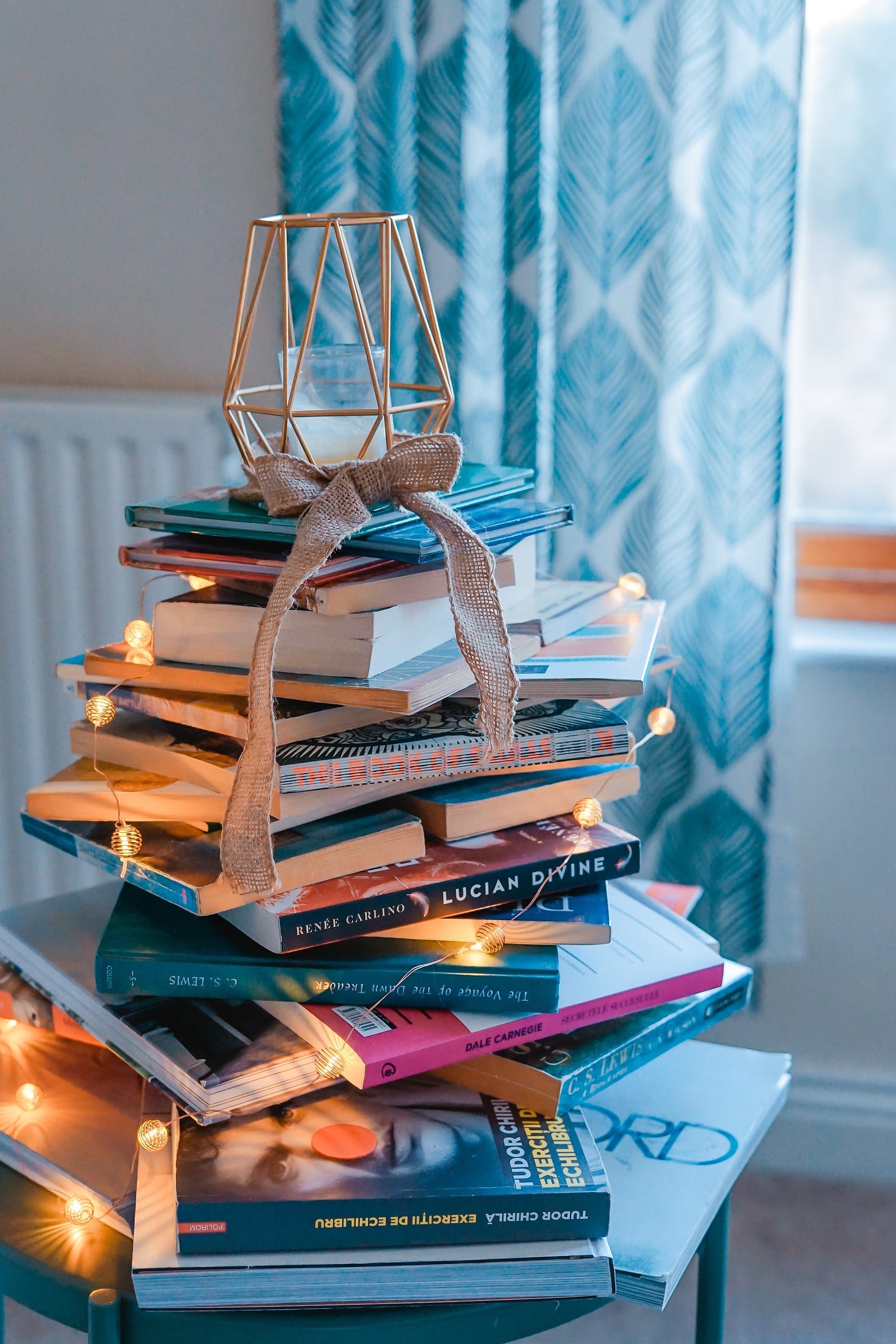
Got a stack of books growing somewhere in your house? Snap a picture and send it in along with a few words about how that stack came to be built, your hopes and dreams for it, or what it makes you feel when you cast your eye over those spines.
Welcome New Subscribers!
And you keep on coming! Welcome to all new subscribers. Thank you so much for being here. If you would like to check out past issues, here’s a quick link to the archives. Be sure to check out our Resources for Readers and Writers too. And help us spread the word by sharing Spark with your friends. Here’s a button to make that easy:
That’s it for this week. Let me know how you are and what you’re thinking about. And of course, always let me know what you’re reading. If there’s an idea, book, or question you’d like to see in an upcoming issue of Spark, let us know!
Remember, If you like what you see or it resonates with you, please share Spark with a friend and take a minute to click the heart ❤️ below - it helps more folks to find us!
Ciao for now!
Gratefully,
Betsy
P.S. And now, your moment of Zen…Crazy Winter Light
Today's moment of Zen comes from subscriber Lisa H. who found a bit of magic on her walls recenlty. “The winter light does crazy things!” she writes.
Calling for Your Contribution to “Moment of Zen”
What is YOUR moment of Zen? Send me your photos, a video, a drawing, a song, a poem, or anything with a visual that moved you, thrilled you, calmed you. Or just cracked you up. This feature is wide open for your own personal interpretation.
Come on, go through your photos, your memories or just keep your eyes and ears to the ground and then share. Send your photos/links, etc. to me by replying to this email or simply by sending to: elizabethmarro@substack.com. The main guidelines are probably already obvious: don’t hurt anyone -- don’t send anything that violates the privacy of someone you love or even someone you hate, don’t send anything divisive, or aimed at disparaging others. Our Zen moments are to help us connect, to bond, to learn, to wonder, to share -- to escape the world for a little bit and return refreshed.
Thanks for reading Spark! Subscribe for free to receive new posts and support my work.
And remember,If you like what you see or it resonates with you, please share Spark with a friend and take a minute to click the heart ❤️ below - it helps more folks to find us!


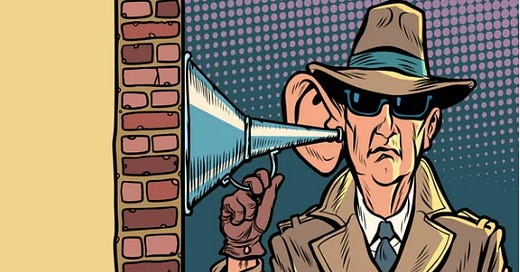

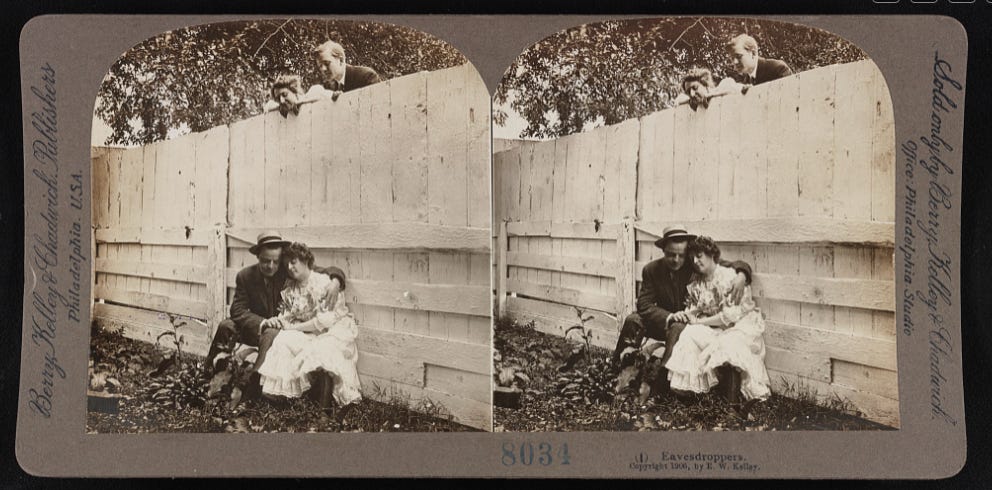
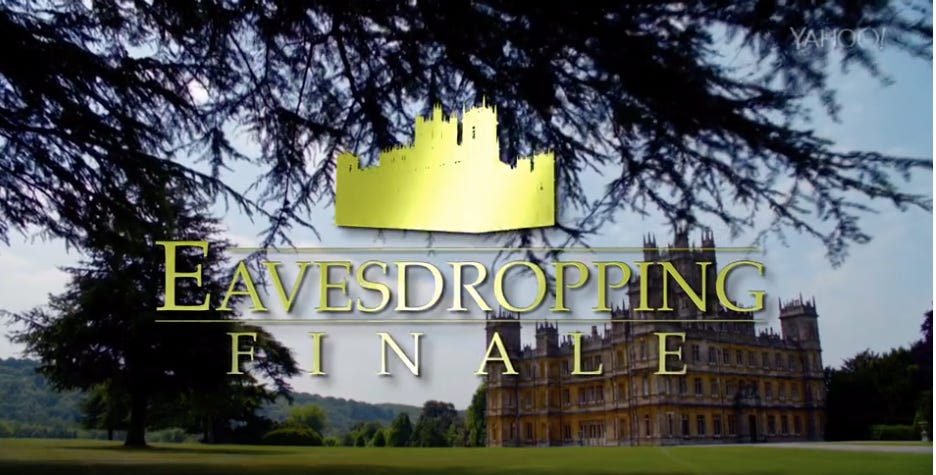
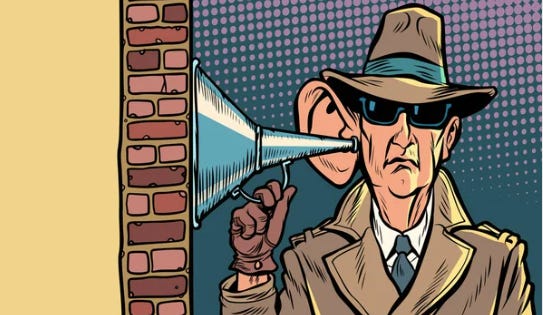
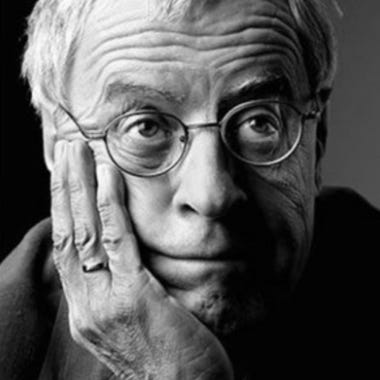
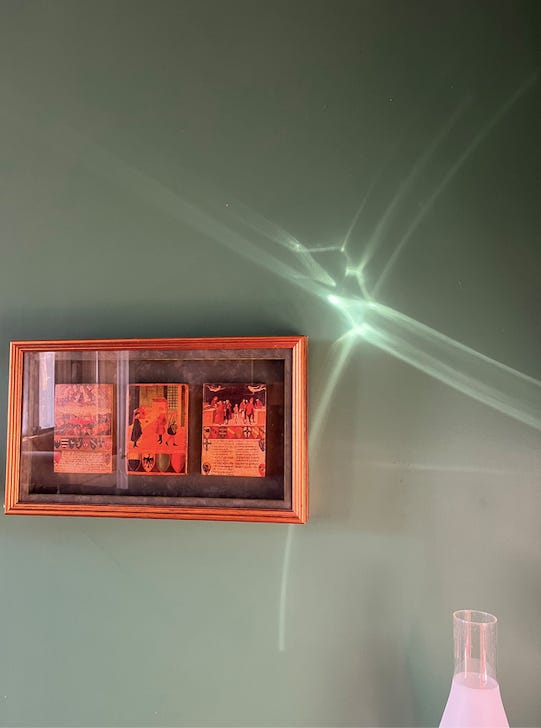
T. Jefferson Parker famously called writers "the secretaries of life" and I ascribe to that. Great fun sometimes, sometimes not, but often quite interesting to learn what's in people's heads - with the exception of loudly spouted politics, that is.
I love eavesdropping and I'm way too good at it. My husband Russel has learned to sit patiently when I have caught a particularly good thread of conversation on a bus or in a crowded diner.
My favorite eavesdropping story is a modern one. Russel and I were in a big box store when then young woman on her cell phone in the next aisle started complaining, loud enough so that we could both easily hear her, about people knowing she was pregnant when she hadn't told them.
When we progressed into that aisle she was hanging up in a huff. Embarrassed, I slipped by her cart, avoiding her eyes, only to hear Russel offer her his congratulations!